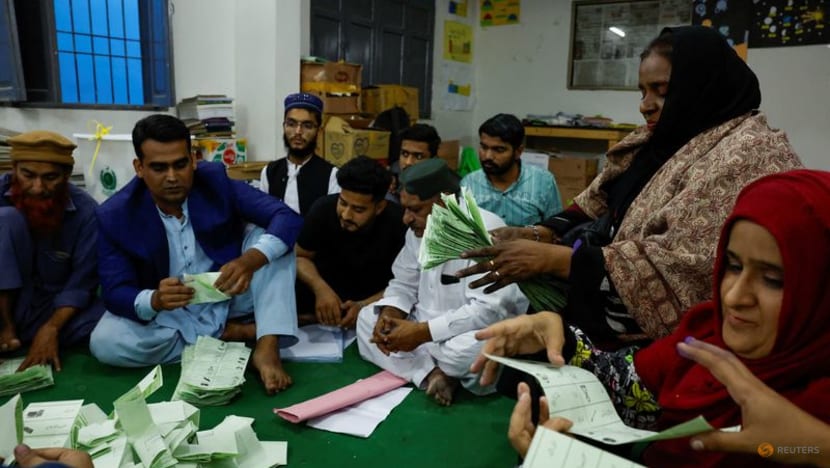Imran Khan’s PTI-backed candidates emerge as strong contenders in Pakistan election
Depending on who wins the election, Pakistan could see some violence based on the results, one analyst said.

Polling officers count ballot papers during the general election in Karachi, Pakistan February 8, 2024. REUTERS/Akhtar Soomro

This audio is generated by an AI tool.
With a vote count underway, candidates backed by jailed cricket star Imran Khan’s Pakistan Tehreek-e-Insaf (PTI) have emerged as a challenge to former prime minister Nawaz Sharif, who has been widely regarded as the man to beat.
The independent candidates’ popularity is not unexpected, analysts told CNA on Friday (Feb 9).
It was projected that if electoral turnout was healthy, these candidates might pull off a surprise victory, said Associate Professor Mariam Mufti from the Department of Political Science at University of Waterloo in Canada.
Caretaker Prime Minister Anwaar ul Haq Kakar said that turnout was high among the about 128 million registered voters.
As of Friday afternoon, the Election Commission of Pakistan (ECP) had announced results for 15 of the 265 contested seats in parliament, according to Al Jazeera’s live blog, showing close competition between PTI and Sharif’s Pakistan Muslim League-Nawaz (PML-N) party.
The high voter turnout shows that PTI has been the most popular political party in the run-up to the election and that citizens went out to show their allegiance, said Dr Mufti.
“The electorate in Pakistan has generally been so disheartened by the allegations of corruption, by the fact that this election was being referred to as a selection instead of an election where the military had already predetermined the winner, that I think voters have come out to show that they had a choice and that they were going exercise their choice,” she told CNA’s Asia First.
Observers believe the nation’s powerful military is backing Sharif. The military has denied such allegations, and says it remains apolitical.
Dr Amit Ranjan, research fellow at the National University of Singapore’s Institute of South Asia Studies, noted that even before the election was announced, there were reports that PTI was going to do well.
This is despite the commission in December stripping PTI of the iconic bat symbol on technical grounds that the party had not held internal elections, a prerequisite for any political party to take part in national polls.
PTI candidates contested using individual symbols.
SUPPORT FOR PTI-BACK CANDIDATES
Dr Mufti noted that “the military has really gone after PTI”.
“It is quite unprecedented what we have seen happen to the PTI in just a short six months since the arrest of Imran Khan,” she said.
Arguably Pakistan’s most popular politician, 71-year-old Khan is currently in prison on charges he has said are politically motivated.
Khan’s message that the military – which has been known to heavily meddle in Pakistan’s politics – was involved in his incarceration is resonating with the people in Pakistan, said Dr Mufti.
Khan assumed the role of prime minister in 2018 before being ousted from power in 2022, after falling out of favour with the powerful military.
Both the military and Pakistan’s caretaker government have denied suppressing Khan or his party.
“Voters and citizens in Pakistan are really tired of the military's interventions and politics. The military in Pakistan likes to control the narrative. And this time around, it is not being able to control the narrative as successfully as it has done in the past,” she said.
“It remains to be seen whether or not this is going to cause the military to take a backseat and perhaps let electoral politics play out in the country.”
Dr Ranjan noted that Khan is popular especially among the youth, who made up nearly 45 per cent of registered voters, and the middle class.
FUTURE OF PAKISTAN
Dr Ranjan noted that if everything goes fairly, there is a possibility that the PTI could win a majority of votes.
“That will be a very tricky situation,” he noted.
Depending on who wins the election, Pakistan could see some violence based on the results, he added.
“Because there are many youths and many supporters of Imran Khan, they feel that his party is going to win. If the PTI does not (win), (supporters) may come out on the streets, like earlier,” he said, referring to protests following Khan’s arrest.
Dr Mufti added that if the result ends in a hung parliament where no political party wins enough seats to secure an overall majority, parties will need to coax others to form a coalition government. This will likely cause instability in the country in the coming months, she said.
However, as the nation awaits the results, Dr Mufti stressed that Pakistan, which is struggling under the weight of economic woes like high inflation, desperately needs an elected government to take charge of the country's affairs.
This is because the present caretaker government cannot negotiate legally with the International Monetary Fund to secure another financial bailout, she said.
“We (Pakistan) might be bracing ourselves for continued turmoil, at least definitely in the short term, because Pakistan's economic situation is not very stable. In fact, the economic situation is quite dire,” she said.
















